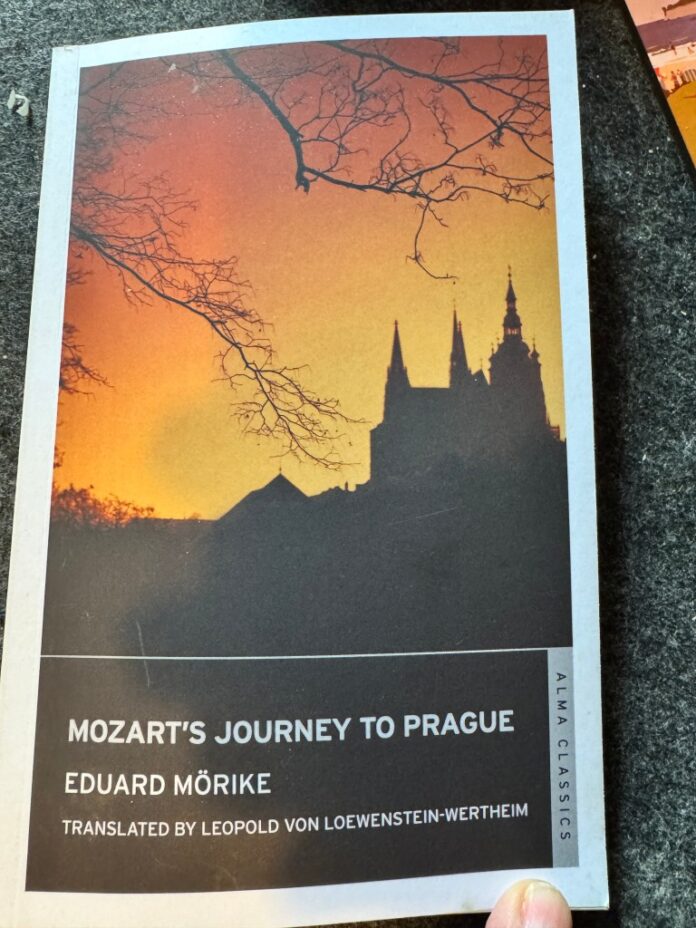Mozart’s Journey to Prague by Eduard Mörike
German Literature
Original title – Mozart auf der Reise nach Prag
Translator –Leopold von Loewenstein-Wertheim
Source – Personal copy
I moved away from France in my year of Classics and went to Germany for a short, quirky novel written by Eduard Mörike, a Lutherananutherinan priest who studied in Tübinghen when he passed his Theology degree, he became a Vicart in a rural parish, but over time his writing took over he was considered one of the best lyrical poets of his time,. This book ends with one of his poems and Imagines a Day in the Life of the composer Mozart as he heads to Prague for the premiere of his Opera Don Giovanni. Happens to steal a bitter orange off a tree. This book has been made into film and A radio play in Germany over the years.
Most Gracious Lady,
Here I sit, a wretch in your paradise, like Adam after he had eaten the apple. The damage has been done and I cannot even blame Eve, who at this very moment is innocently sleeping in a four-poster at the inn, with Cupids and Graces hovering around. Command me, your Ladyship, I am at your disposal to answer for my extraordinary misdeed.
In sincere confusion, your Ladyship’s humble servant,
W.A. Mozart,
on his way to Prague.
He handed the note rather clumsily folded to the uneasily waiting servant and told him to deliver it to the Countess.
The letter he wrote after getting caught having the orange
We see Mozart heading with his wife, Constance, from Vienna to Prague. When they stop at a country estate mid-route, and Mozart sees an Orange on a bitter orange tree, he takes it but is seen by the estate Gardener. He then writes them a letter of apology (I love that there is still a time when the written word is needed to make peace with the local gentry, sow ehn the countess invites them for the night to stop with them Mozart and his wife to spend the evening with them. The count is celebrating his Niece Eugenie’s engagement. So, as the couple fit in, Mastero is asked to play them a piece from his forthcoming opera, which he is happy to do. But as this happens, Eugenie sees something troubling in Mastero’s future. Will his Art finally eat him up? This leaves Mozart questioning his life and how entwined his life and music are!
“I feel,” whispered Eugenie with shining eyes, while everyone expressed their approval of what they had just heard, “that we have seen a whole symphony in colour, a perfect example of the spirit of Mozart in its gayest guise. Don’t we see the whole charm and gracefulness of Figaro in this?”
Her fiancé was about to convey this remark to Mozart when the latter continued:
“Seventeen years have now gone by since I last saw Italy,” he said, “but who, having once seen it, especially Naples, would not think of it for the rest of his life – even if he had been no more than a child as I was. But never before has the memory of that beautiful evening in the Gulf of Naples returned to me so vividly as today in your garden. When I shut my eyes – brilliant, distinct and clear, without the thinnest veil to obscure it – the divine landscape lay before me: the sea, the coast, the mountains, the city, the colourful crowds lining the shore and then that strange fantastic ball game over the water.
His music sparks the family he is playing for
I will hold my hand up I am not a substantial Classical fan I have tried over the years and am aware of Mozart and his career in parts. So, for me, this was one of those books that I had to turn to and have a deep dive into his music and the opera and how it all fitted in on his timeline, especially with Eugenie’s talk of Mozart dying and his life. Mörike actually mixes the facts of the events up in his novella. But at the book’s heart is the connection between the Mastero’s life and music. A life we were all reading was short, but he didn’t know this until the small glimpse from Eugenie into his future. This book can be read in the evening. It is what Peirene calls a film book and can be read in a couple of hours. If you like classical music, you will get more out of it than I would. I do have DSenis Forman’s Night at the Opera, a book that I picked up, so when I need context around a work of Opera, I can see what he said. This was at the time after his last opera wasn’t well received in Vienna; he was now Prague’s golden boy. Have you read this fun little novella?
Related
Published by


